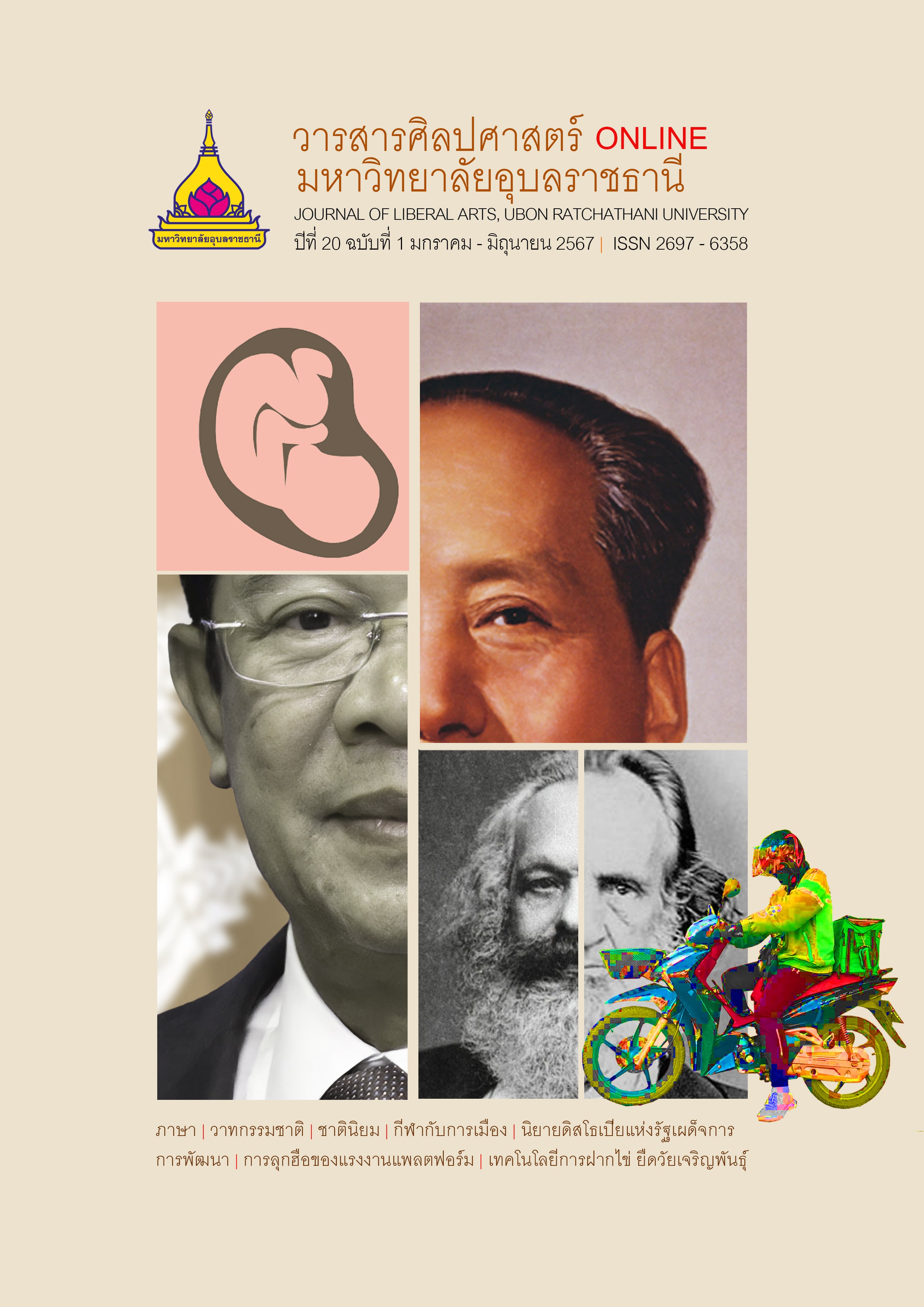การวิเคราะห์การประกอบสร้างวาทกรรมความเป็นชาติ ผ่านความรู้ทางศาสนาในแบบเรียนสังคมศึกษา ระดับมัธยมศึกษาตอนปลาย
Main Article Content
บทคัดย่อ
บทความนี้มีวัตถุประสงค์เพื่อศึกษาและวิเคราะห์การธำรงรักษาความหมายและคุณค่าของความเป็นชาติไทยผ่านความรู้ทางศาสนาด้วยตัวบทในแบบเรียนสังคมศึกษาระดับมัธยมศึกษาตอนปลาย เป็นการวิจัยเชิงคุณภาพโดยใช้วิธีการวิเคราะห์วาทกรรมเชิงวิพากษ์ตามแนวทางของแฟร์คลัฟ บนกรอบแนวคิดชุมชนจินตกรรมและแนวคิดอำนาจเหนือชีวิต จากตัวบทในแบบเรียนสังคมศึกษาระดับมัธยมศึกษาตอนปลายที่คัดเลือกในส่วนที่มีความสัมพันธ์กับศาสนาและชาติไทย จำนวน 13 เล่ม ผลการวิจัยแสดงให้เห็นว่า วาทกรรมในแบบเรียนได้สร้างความเป็นชาตินิยมทางวัฒนธรรมที่มุ่งเน้นธำรงรักษาสถานะเดิมทางสังคมเอาไว้ โดยมีการใช้กลวิธีทางภาษาที่หลากหลายเพื่อถ่ายทอดวาทกรรมและอุดมการณ์ที่ซ่อนอยู่ในตัวบท ตลอดจนเปิดเผยภาคปฏิบัติการทางวาทกรรมความเป็นไทย ว่าเป็นการสืบทอดจรรโลงเสาหลักของสังคมไทย อันได้แก่ ชาติ ศาสนา พระมหากษัตริย์ และวัฒนธรรมไทย แบบเรียนมีผลต่อสังคม และอิทธิพลของสังคมก็ส่งผลต่ออุดมการณ์ในแบบเรียน โดยตัวบทแสดงให้เห็นว่าคนในสังคมยังเน้นการสืบสานและรักษาวัฒนธรรมไทย โดยอุดมการณ์ต่าง ๆ ที่อยู่ในตัวบทของแบบเรียนสื่อไปยังผู้อ่านผ่านกลวิธีทางภาษาที่หลากหลายมีความสัมพันธ์กับบริบทที่รายล้อมตัวบทของแบบเรียน เนื่องจากแบบเรียนผลิตขึ้นภายใต้การดูแลของหน่วยงานภาครัฐ จึงทำให้แนวนโยบายต่าง ๆ ของรัฐ เข้าไปมีอิทธิพลต่อการสื่ออุดมการณ์ต่าง ๆ ในตัวบทแบบเรียน ซึ่งรัฐกำหนดให้เด็กทุกคนต้องเข้ารับการศึกษาในระบบการศึกษาขั้นพื้นฐานทั่วประเทศ จำเป็นต้องใช้แบบเรียนนั้นสามารถเข้าถึงแบบเรียนได้อย่างสะดวก อุดมการณ์ต่าง ๆ ในตัวบทแบบเรียนจึงแพร่กระจายไปสู่สังคมในวงกว้างได้
Downloads
Article Details

อนุญาตภายใต้เงื่อนไข Creative Commons Attribution-NonCommercial-NoDerivatives 4.0 International License.
เอกสารอ้างอิง
Anderson, B. (2006). Imagined Communities: Reflections on the Origin and Spread of Nationalism (revised version). London: Verso.
Buaklang, S. (2016). State Neutrality and Freedom of Religion and Belief. [In Thai]. Master of Laws Dissertation (Public Law, Thammasat University.
Charoensin-o-larn, C. (2017). Development Discourse: Power, Knowledge, Truth, Identity and Otherness. [In Thai]. 6thed. Bangkok: Vibhasa publishing.
Chotiudompant, S. (2005). Discourse Representation and Identity. Discourse Representation and Identity Literary Studies in Social and Cultural Context, November 24, 2005, Faculty of Arts Chulalongkorn University, Bangkok: Chulalongkorn University.
Chumwangwapee, T. (2019). Cultural Discourse and Non-Multiculturalism in Social Studies Curriculums and Textbooks. [In Thai]. Mekong Chi Mun Art and Culture Journal, 5 (1), 121-160.
Dewey, J. (1938). Experience and Education. New York: Macmillan Company.
Fairclough, N. (1995). Critical Discourse Analysis the Critical Study of Language. London and New York Longman.
Foucault, M (1981). The Order of Discourse. In R., Young (Ed.) Untying the text: A Post-Structuralist reader, (pp. 51-76). Massachusetts: Routledge.
Giroux, H.A. (1991). Postmodernism as Border Pedagogy: Redefining the Boundaries of Race and Ethnicity. Postmodernism, Feminism, and Cultural Politics. Albany: State University of New York Press.
Leawpiroj, N. (2018). The imagined communities of "Thai Nation" in social studies textbooks during 1957-2017. [In Thai]. Ph.D. Dissertation (Integrated Science), Thammasat University.
Mikusol, P. (2008). Fundamental History textbook I (Secondary) [In Thai]. Bangkok: WattanaPanich Publishing.
Ministry of Education. (2008). Fundamental Buddhism Textbook (Secondary) of Social Studies, Religion and Culture Department. [In Thai]. Bangkok: Suksapanpanit Publishing.
Ministry of Education. (2008). The Basic Education Core Curriculum B.E. 2551 (A.D. 2008). [In Thai]. Bangkok: The Agricultural Cooperative Federation of Thailand., Limited.
Ministry of Education. (2010). Fundamental History Textbook I (Secondary) of Social Studies, Religion and Culture Department. [In Thai]. Bangkok: Suksapanpanit Publishing.
Morris, M. (2001). Curriculum and the Holocaust: Competing Sites of Memory and Representation. New York: Routledge.
Nakhirak, C., Narasat, W. & Kulsaengcharoen, M. (2008). History textbook I (Secondary) [In Thai]. Bangkok: Institute of Academic Development Publishing.
Phathong, K. & Serirangsan, T. (2018). Buddhism and Politics in Thai Society. [In Thai]. Valaya Alongkorn Review (Humanities and Social Science), 8 (1), 195-207.
Phrakhrurattanakornvisut, Phrakhrusangkhawisuthikhun and Phrakhrupariyatsuwattanaporn. (2022). The Principles of Brahmaviharas and Women's Rights. [In Thai]. Journal of Buddhamagga, 7 (1), 269–281.
Pirantaowad, O. (2011). Communication, participation and people's satisfaction in community radio in Ubon Ratchathani Province and Rayong Province (October 1998-August 2001). [In Thai]. Research Reports. Bangkok: Faculty of Arts Chulalongkorn University.
Poomraruen, A. (2014). A Social Study Textbook: the Reflection of State Requirement, 1960-2012. [In Thai]. Theses (Master's degree of Historical Studies), Silpakorn University.
Poomraruen, A. & Rodpol, N. (2017). Creating a Good Citizen in the State Prior to the Coup 1958. [In Thai]. Veridian E-Journal, Silpakorn University (Humanities, Social Sciences and arts), 10 (1), 1590- 1603.
Prachyaprui, A. (2011). Postmodern and Higher Education. [In Thai]. Bangkok: Intapas Publishing.
Prathepvethee. (1990). A Dictionary of Buddhism. [In Thai]. Bangkok: mcupress.
Senthong, P. (2019). The Political Ideology: Thai Political Ideology. [In Thai]. Journal of Graduate Studies Valaya Alongkorn Rajabhat University, 13 (3), 230-248.
Sripokangkul, S. (2020). Education for the Production of Docile Subjecthood: Implications of Civic Education Subject in Thai Schools. [In Thai]. Journal of Human Rights and Peace Studies, 6 (1), 28 – 59.
Sukata, S. & Bunnag, N. (2015). Discourse Analysis of Thai Nationalism in Social Studies and Historical Textbooks [In Thai]. Thai Interdisciplinary and Sustainability Review, 4 (1), 126-137.
Taweesak, S. (2019, 3 February). Abolish Compulsory Religious Education in Public Schools. [In Thai]. Prachatai. https://prachatai.com/journal/ 2019/02/80860
Vichanati, S., Wanhakich, P. & Vichanati, J. (2021). Integrated Learning Management of Buddhism. [In Thai]. Panidhana Journal, 17 (2), 233-256.


